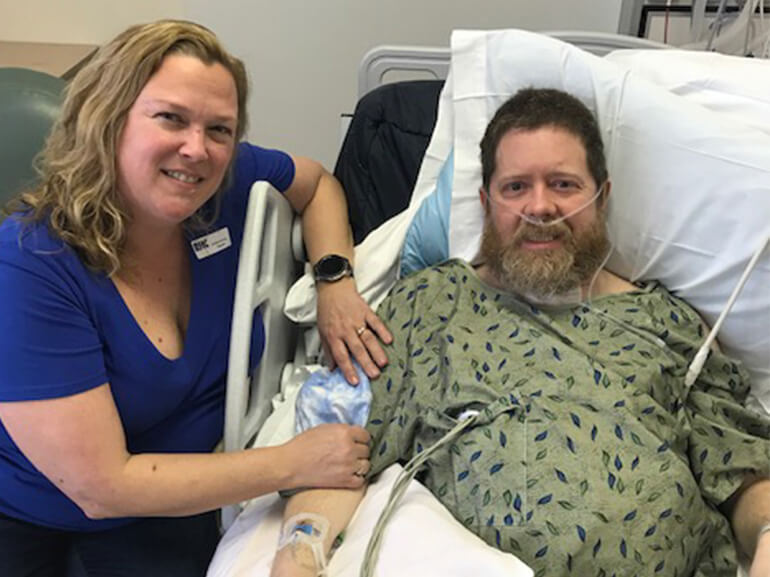Charlie's story

Charlie Landsman was at home when a searing headache wrapped across his forehead. The 47-year-old figured it was another manifestation of his recently diagnosed migraine disorder.
But when he awoke the next morning to right-sided weakness and breathing trouble, Charlie knew he needed help. He called 911 and an ambulance rushed the computer specialist to Abbott Northwestern Hospital, where doctors discovered a stroke.
Transferred to intensive care, Charlie declined and was placed on a ventilator. Later, surgeons placed a tracheostomy for airway support and feeding tube.
When Charlie stabilized, his wife, Chrissy, chose Regency Hospital Minneapolis for additional healing and recovery.
Despite bouts of weakness and confusion, Charlie’s goals were clear: getting home and breathing independently.
A physician-led team, including nurses and therapists, created a plan to get him there.
Respiratory therapy began working to liberate Charlie from the ventilator. Guided by a pulmonologist, the team stepped him through a series of lung-strengthening exercises. They also used monitored bursts of time off the ventilator, allowing his lungs to take on more work.
In time, Charlie was liberated from the ventilator and transitioned to humidified oxygen connected to his tracheostomy. Several days later, he transitioned again to a special valve that permitted more normal speech.
As Charlie’s mental fog lifted, his ability to participate in therapy improved. He met a major milestone when, working with his speech therapist -- he could speak loud enough to hear his own voice. After nearly a month of silence, it was a profound experience, he said.
From there, Charlie began working extensively with his physical, occupational and speech therapy team to regain the ability to walk and care for daily needs. Through balance, coordination and strength-building exercises, physical therapists helped Charlie’s brain and body reconnect. Over time, he relearned how to stand, pivot and take several steps. Physical therapists led him on short walks down the hallways.
Speech therapists and dietitians worked together to retrain swallowing reflexes and resume regular meals so his feeding and breathing to tube were removed.
In just three weeks, Charlie met all goals and was ready for the next phase of healing. He departed for an inpatient rehabilitation hospital to spend several more weeks rebuilding strength before returning home.
Charlie and Chrissy were adamant that without the excellent care he received at Regency Hospital, he would not have recovered so well.
His plan was to “keep fighting” and regain as much independence as possible.
Charlie’s illness helped him appreciate the little things in life, like being able to put on his shoes and socks. That, he said, is at the top of the list for his inpatient rehabilitation goals.
As to what he’s learned from his critical illness and recovery: “You can’t change what happened, but you can change what happens next.”